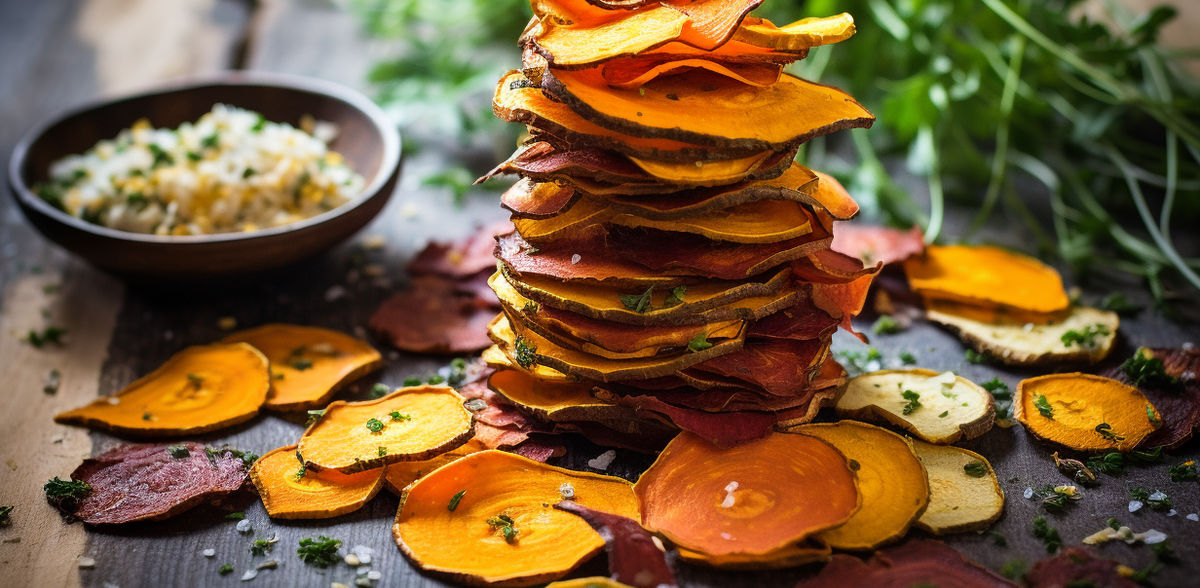The snack trap: potato chips made from vegetables are not healthier
The fat content is sometimes higher than that of classic potato potato chips
potato chips or snacks made from chickpeas, lentils, sweet potatoes or parsnips are no healthier than potato potato chips. That is the conclusion of a random market sample by the NRW consumer advice center. The nutrition experts have thus partially repeated a market check from 2020. "Unfortunately, the result has not changed," says nutrition expert Katrin Böttner. "The following still applies: if it says 'vegetables' on potato chips, it sounds healthier, but it usually isn't."
Three years ago, the NRW consumer advice center examined the nutritional values of 80 alternative vegetable chip products and snack items made from corn, cereals and pulses and recommended not to fall for the healthy vegetable image. The current random sample of twelve alternatives to conventional potato chips and snacks now shows once again that the frequently advertised lower fat content does not automatically mean that they contain fewer calories.
Potato chips made from pulses: Around 450 kilocalories per 100 grams
"We selected six chip-like products each made from pulses and vegetables and compared their calorie, fat and salt content with that of potato chips," says Katrin Böttner. Chips made from pulses in particular are often advertised with claims of between 30 and 55 percent "less fat than conventional chips". However, a closer look reveals that although the claim is correct, a lower fat content does not automatically mean a correspondingly lower calorie content. On average, the potato chips made from pulses in the sample contain around 450 kilocalories per 100 grams. Potato potato chips have an average of around 540 kilocalories per 100 grams. This means a calorie saving of only around 17 percent. At around 510 kilocalories per 100 grams, the vegetable potato chips in the sample contained almost the same amount of calories and in some cases more fat than potato potato chips. "This is not what consumers expect when they reach for these products," says Böttner.
The truth is only in the small print
Only a few products offer real calorie savings. "Above all, the reference to a significantly lower fat content can encourage people to buy them," says Böttner. "Many people then don't even look at the nutritional information in small print, where it is clear how high the calorie content really is. And the images of fresh vegetables on the packaging also reinforce the impression of healthy products that allow you to nibble without regret." The salt content of some of the products we looked at is also alarmingly high. The recommendation to eat only in moderation therefore applies to potato chips made from pulses and vegetables as well as potato potato chips.
Practical tip from nutrition expert Böttner: "To resist the temptation to snack too much at once, you can put one portion in a small bowl and put the rest of the bag out of reach. If you want to eat more vegetables or pulses, it's better to go for fresh food. The alternative potato chips may bring a change of taste to the snack shelf, but they are not suitable for optimizing your diet."
Note: This article has been translated using a computer system without human intervention. LUMITOS offers these automatic translations to present a wider range of current news. Since this article has been translated with automatic translation, it is possible that it contains errors in vocabulary, syntax or grammar. The original article in German can be found here.
Most read news
Topics
Organizations
Other news from the department science

Get the food & beverage industry in your inbox
By submitting this form you agree that LUMITOS AG will send you the newsletter(s) selected above by email. Your data will not be passed on to third parties. Your data will be stored and processed in accordance with our data protection regulations. LUMITOS may contact you by email for the purpose of advertising or market and opinion surveys. You can revoke your consent at any time without giving reasons to LUMITOS AG, Ernst-Augustin-Str. 2, 12489 Berlin, Germany or by e-mail at revoke@lumitos.com with effect for the future. In addition, each email contains a link to unsubscribe from the corresponding newsletter.




























































